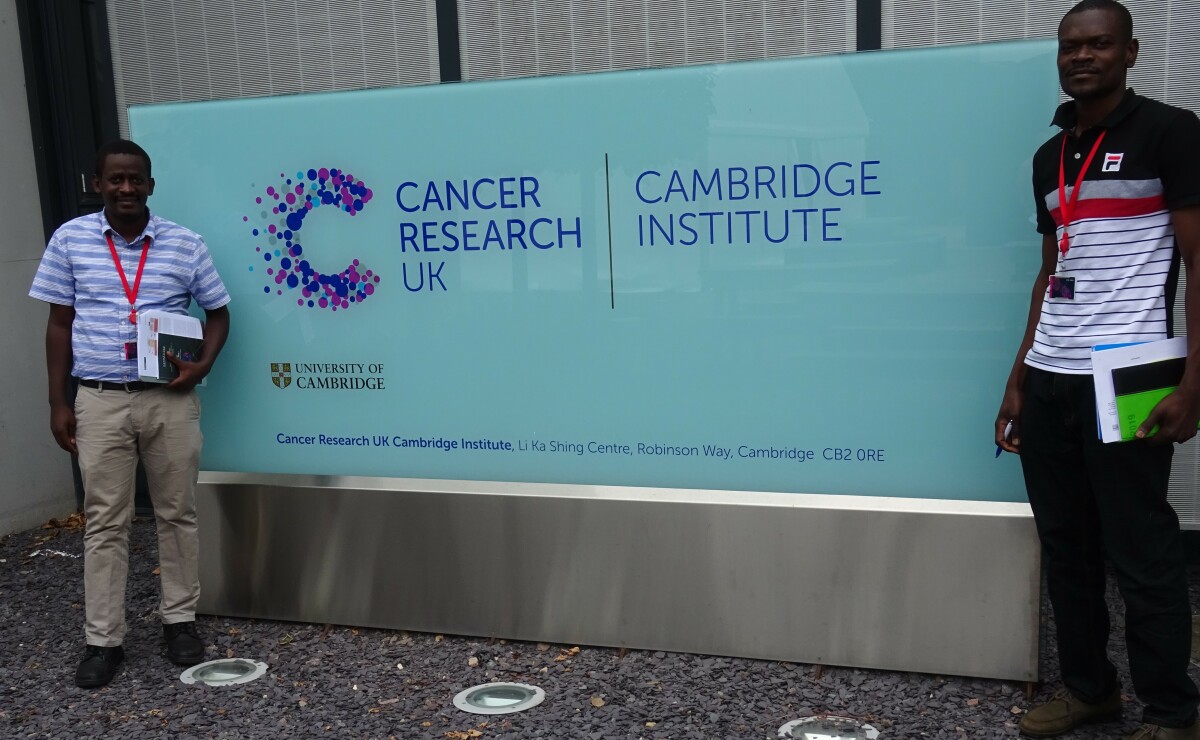Ugandan cancer researchers spend the summer at CRUK Cambridge Institute

Written by Henry Wannume and Paul Katongole.
Henry Wannume and Paul Katongole have spent June and July in Cambridge as part of a pilot scheme for a new Summer School that is to be established from 2020 at the CRUK Cambridge Institute. The Summer School will provide research training for students who are thinking of a future career in cancer research. The summer school will have a total of 12 places, 2 of which will be reserved for Ugandan students, with the other places for UK students. The admission to the summer School will be highly competitive. We asked Henry and Paul to provide a blog describing their backgrounds and their experience in Cambridge.
Henry Wannume. I trained as a Medical Laboratory Scientific officer and nowwork with the Uganda Cancer Institute (UCI), Kampala, Uganda. Prior to working on cancer, I had 6 years research experience working with malaria vaccine trials. Since joining UCI in 2015, I am a technical staff member at the clinical laboratories at the Institute while participating as a laboratory technologist on a clinical drug trial to test oral chemotherapy outcomes in the treatment of Breast Cancer patients. In addition, I am the Laboratory Quality Officer and ensure that standard quality documents for the laboratory are developed and effectively implemented at the UCI laboratories.
I am also working on my thesis for a Master of Science in Molecular Biology and Biotechnology at Makerere University Kampala, Uganda. My interest in Breast cancer research attracted me to this summer training scheme at Professor Carlos Caldas’ Laboratory, CRUK-CI which has a vast experience in Functional Cancer Genomics Research.
This was a ‘pilot’ summer school program of 2019, funded by the Cambridge-Africa Programme and supported by the CRUK Cambridge Institute with an eight weeks placement in the Carlos Caldas laboratory. The main aim for the placement was to build capacity in Breast cancer research and other related laboratory techniques that exist at the facility. This visit was an outcome of the establishment of a collaboration between the Cancer Research UK- CI and the Uganda Cancer Institute, Kampala, Uganda, facilitated by the Cambridge-Africa programme. During the placement, I actively participated in working on a number of experiments in the area of genomics which included DNA/RNA extractions, qPCR and gel electrophoresis. In addition, I have been exposed to patient derived tumour xenograft projects, protein studies, drug dosing experiments, culturing of breast cancer cells, preparation of samples for sequencing among other experiments. This excellent and well laid out flow of research activities was attractive and can be translated at our research laboratories in Uganda.
During the training, I attended two international conferences which were geared towards Cancer research these were: The 13th International PhD Student Cancer Conference held at the Netherlands Cancer Institute from 12-14 June 2019 in Amsterdam, and The 4th European Association for Cancer Research (EACR) Conference on Cancer Genomics 2019 held at Churchill College, Cambridge UK, 23-26 June 2019. My placement provided me with a great opportunity to learn from well-known researchers, while obtaining skills that I can use back home at the UCI for the benefit of our patients. This knowledge will also be helpful during the collection, analysis and interpretation of the research data towards accomplishment of my MSc in Molecular Biology and Biotechnology.
Paul Katongole. I am a Medical Doctor with a Masters in Medical Microbiology,Immunology and Molecular Biology from Makerere University in Uganda. I have 7 years of working experience in clinical and translational research and my research goal is to improve cancer care and treatment by using new and improved cancer diagnostic tools and methods in low and middle-income countries. Currently I am on a PhD fellowship, funded by the Uganda Cancer Institute (UCI), AfDB fund and Nurture-MESAU research projects. The PhD fellowship will address the role of the gut microbiome in Prostate cancer disease pathogenesis. The study will look at how microbial organisms modulate the immune system and how this interplay affects patients’ clinical outcomes.
While at Cancer Research UK – Cambridge Institute, I was under Nitzan Rosenfeld’s lab under the mentorship of Davina Gale. During this period, I was able to learn and undertake a number of cancer biology experimental techniques including: circulating tumour DNA(ctDNA) extraction, Illumina library preparation, Nanopore sequencing, Copy number Variants analysis, DNA methylation primer design and library preparation and digital PCR experiments. This training has impacted my skills capacity and built my knowledge towards understanding and solving problems in cancer research. The skills will be very instrumental in my PhD project and future research projects.
During the training, I was also able to attended two international conferences which were geared towards Cancer research these were: The 13th International PhD Student Cancer Conference held at the Netherlands Cancer Institute from 12-14 June 2019 in Amsterdam, and The 4th European Association for Cancer Research (EACR) Conference on Cancer Genomics 2019 held at Churchill College, Cambridge UK, 23-26 June 2019. I plan to use this knowledge and skill to work with a team at UCI to build cancer research capacity and also train students.

